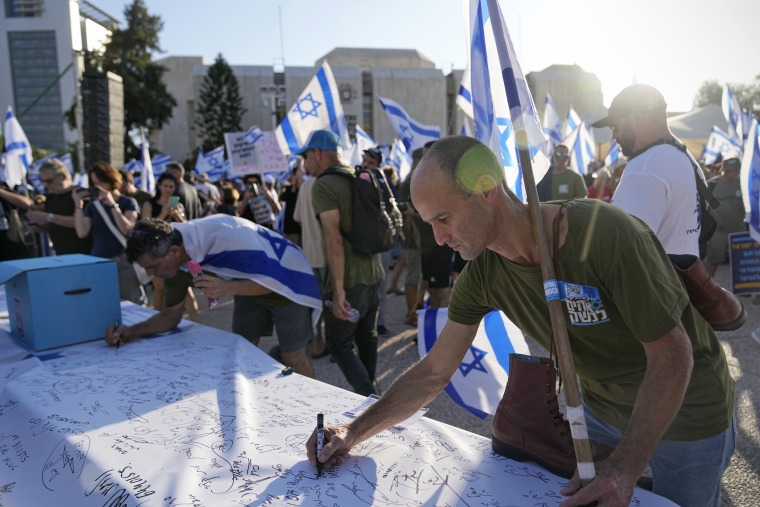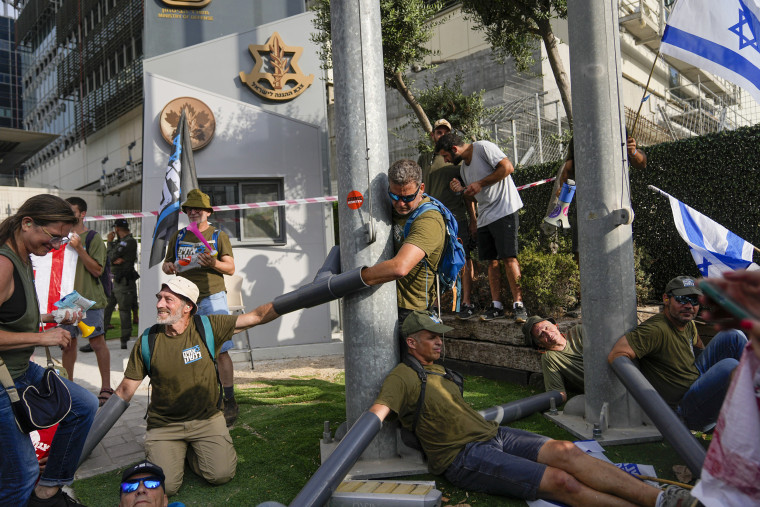TEL AVIV — The people’s divisions have spread to “the people’s army.”
Israel’s roiling national crisis over a new law to weaken the Supreme Court is affecting the Israel Defense Forces, an institution that for most of the country’s history has been seen as being above politics.
The military, which polls consistently find is the public body Israelis trust most, now faces questions about whether it can remain a symbol of national unity and whether its operational readiness has been compromised by internal divides.
“We have tried to stay out of the current discourse, but given its current prominence in Israeli society, we got caught up in it, and our unity was impaired. It is our duty to prevent these cracks from widening,” Lt. Gen. Herzi Halevi, the IDF chief of staff, said in an address to his troops this week.
The most acute crisis facing the military comes from thousands of reservists who say they will stop volunteering in protest of the legislation, a crucial part of which passed Monday despite mass demonstrations and a walkout by every opposition politician during the vote.

While Israel mandates military service for young people, it still relies on experienced reservists for many roles. That is especially true in the air force, where in some squadrons half of the pilots are reservists rather than full-time airmen. Reservist officers can have weeks when they carry out strikes on Syria one day and are back at their civilian jobs the next.
Last week, 1,142 air force reservists announced they would end their volunteer duty in protest of Prime Minister Benjamin Netanyahu’s attempt to overhaul the judiciary. Their joint letter sent shock waves through Israeli society. Among its signers was Lt. Col. N., who asked to be referred to only by his rank and initial because of his recent involvement in national security issues.
An F-16 pilot for over three decades, N., 61, had until last week been a reservist at air force headquarters.
“It was one of the most difficult decisions I’ve ever taken in my life. It’s many nights of turning in bed not being able to sleep,” he said.
“I came to the conclusion that this government is the biggest danger that Israel faces right now. More than any external enemy or threat, be it Iran, Hezbollah, anyone out there,” he said. “Since I don’t believe in violence inside Israel, the only option that I was left with is to stop serving in reserve, because I don’t want to serve a dictatorship.”
The reservist said he would return to service if the legislation were reversed and further plans for the judicial overhaul were scrapped.
“I want to go back. My conscience is torn apart, even today. I think I did the right thing, but I don’t sleep well. It’s lose-lose,” he said.
Danny Orbach, a military historian and professor at the Hebrew University of Jerusalem, said the reservists’ refusal to attend training would hurt the air force’s readiness as their fitness to fly lapses. They would also be difficult to replace in the long term, he said.
“To train a pilot to lead four planes in a squadron takes about 15 years, including combat experience,” he said. “You can imagine it won’t be easy to just fill these missing places.”
Netanyahu and other right-wing politicians have condemned the reservists, accusing them of using their leverage in the national security sphere to try to force the government to give in to liberal political demands.
“Calls for refusal to serve harm the security of every citizen of the state. No government can capitulate to refusal diktat, and we will not give in to such diktat,” he said in a speech Monday, shortly after the bill passed.

Harder to measure is the impact on the IDF’s image within Israeli society. A viral video, shared by several of Netanyahu’s Cabinet members, imagined a scene in which an infantryman pinned down by enemy fire radios for air support. The pilot in the skies above him replies: “Do you support or not support the reform?”
The clip ends with the dying soldier telling the camera: “My brothers, from left and right, politics cannot be brought into the army.”
An Israeli military spokesman condemned the video and leapt to the defense of the air force pilots.
“These are the best fighters and commanders in the IDF, who risk their lives night after night,” he said.
Israel’s enemies are closely watching from the outside as its crises persist from within.
Hassan Nasrallah, the leader of the Lebanese militant group Hezbollah, said Israel’s “trust, awareness and self-confidence have deteriorated into the crisis it is experiencing today.”
The outbreak of war and the threat of destruction by external enemies have unified Israel many times in its 75-year history. In his speech, Halevi called on both reservists and full-time troops to rediscover that unity before it’s too late.
“If we don’t have a strong and united defense force, if Israel’s best do not serve in the IDF, we will no longer be able to exist as a country in the region,” he said.